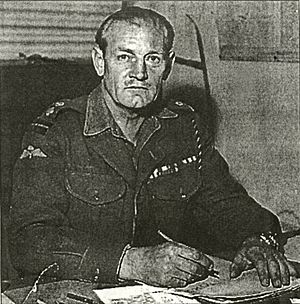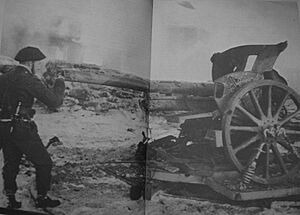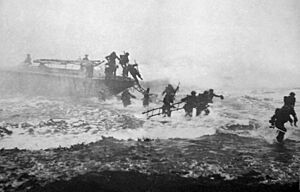Jack Churchill facts for kids
Quick facts for kids
Jack Churchill
|
|
|---|---|

"Mad Jack" Churchill
|
|
| Nickname(s) |
|
| Born | 16 September 1906 Colombo, British Ceylon |
| Died | 8 March 1996 (aged 89) Surrey, England |
| Allegiance | United Kingdom |
| Service/ |
British Army |
| Years of service | 1926–1936 1939–1959 |
| Rank | Lieutenant Colonel |
| Unit |
|
| Commands held | No. 2 Commando |
| Battles/wars | Burma Rebellion 1930–32 Second World War 1948 Palestine War |
| Awards | Distinguished Service Order & Bar Military Cross & Bar |
John Malcolm Thorpe Fleming Churchill (16 September 1906 – 8 March 1996) was a brave and unusual British Army officer. He fought in the Second World War with a longbow, a Scottish broadsword, and even played his bagpipes in battle! People called him "Fighting Jack" or "Mad Jack." He famously said, "Any officer who goes into action without his sword is improperly dressed."
Contents
Early Life and Adventures
Jack Churchill was born in Colombo, which was then called British Ceylon. His family later moved back to England. He had two younger brothers, Thomas and Robert.
Jack went to King William's College and then to the Royal Military College, Sandhurst. In 1926, he joined the army and served in Burma. He loved riding his motorbike there.
In 1936, Churchill left the army. He worked as a newspaper editor in Nairobi, Kenya. He also worked as a male model! Jack was very talented with a bow and arrow and played the bagpipes. He even appeared in a few movies. In 1939, he represented Great Britain in an archery competition in Norway.
World War II Heroics
When Nazi Germany started the Second World War in 1939, Churchill rejoined the army. He was sent to France.
Fighting in France (1940)
In May 1940, Churchill and his men ambushed a German patrol. Churchill used his broadsword to signal the attack. There's a famous story that he killed a German soldier with a longbow. However, Churchill later said his bows had been crushed earlier. After fighting bravely at Dunkirk, he joined the Commandos.
His younger brother, Thomas Churchill, also led a commando group during the war. Their youngest brother, Robert, was killed in action in 1942 while serving in the Royal Navy.
Raid in Norway (1941)
Churchill was second in command during Operation Archery in Norway. This was a raid on a German base in December 1941. As his landing craft reached the shore, he jumped out playing his bagpipes! He played "March of the Cameron Men" before throwing a grenade and charging into battle. For his bravery, he received the Military Cross.
Battles in Italy (1943)
In July 1943, Churchill led No. 2 Commando in Sicily. He carried his Scottish broadsword, longbow, and bagpipes. He did the same when they landed at Salerno.
Churchill was ordered to capture a German observation post. With just one corporal, he snuck into the town. They captured the post and took 42 German prisoners! He led the prisoners back, with the wounded being carried on carts. He said it looked like something from the Napoleonic Wars. He earned the Distinguished Service Order for this amazing action.
He even walked back to the town to find his sword, which he had lost in a fight. On the way, he found some American soldiers walking towards enemy lines by mistake. He warned them to turn back.
Adventures in Yugoslavia (1944)
In 1944, Churchill led Commandos in Yugoslavia. They were there to help the Partisans, who were fighting the Germans. He organized a group of 1,500 Partisans and Commandos to raid the German-held island of Brač.
The landing was easy, but the Partisans wanted to wait to attack. Churchill played his bagpipes to signal the Commandos to battle. After some fighting, he decided to pull back for the night.
Captured by the Germans
The next morning, Churchill led an attack. Only he and six others reached their goal. A mortar shell hit them, killing or wounding everyone but Churchill. He was playing "Will Ye No Come Back Again?" on his pipes when the Germans captured him.
The Germans thought he might be related to Winston Churchill. So, they flew him to Berlin for questioning. Then, he was sent to a special prison camp for important prisoners, Sachsenhausen concentration camp.
In September 1944, Churchill and three Royal Air Force officers escaped Sachsenhausen. They used a secret tunnel they had dug. Churchill and one officer tried to walk to the Baltic Sea. But they were caught near the German city of Rostock.
In April 1945, Churchill and other prisoners were moved to Tyrol. They were guarded by SS troops. The prisoners feared they would be killed. Luckily, a German army unit stepped in to protect them. The SS guards left, and the prisoners were freed. Churchill then walked 150 kilometers (about 93 miles) to Verona, Italy, where he met American soldiers.
End of the War in Burma (1945)
The Pacific War was still going on, so Churchill was sent to Burma. But by the time he arrived in India, the war had ended after the atomic bombs were dropped. Churchill was reportedly sad the war ended so suddenly! He joked, "If it wasn't for those Yanks, we could have kept the war going another 10 years!"
Life After the War
Helping in Palestine
After World War II, Churchill became a parachutist. He was sent to Mandatory Palestine in 1948. There, he helped during a conflict. He tried to help a medical convoy that was attacked by Arab forces. He offered to evacuate people, but his offer was refused.
When no help arrived, Churchill and his twelve men provided cover fire. Two trucks caught fire, and many people were killed. This sad event is known as the Hadassah medical convoy massacre.
After the massacre, he helped evacuate 700 Jewish doctors, students, and patients from a hospital. Today, a road on Mount Scopus in Jerusalem is named "Churchill Boulevard" in his honor.
Movie Appearance
In 1952, Churchill appeared in the film Ivanhoe. He played an archer, shooting arrows from the walls of Warwick Castle.
Surfing Pioneer
Later, Churchill worked as an instructor in Australia. He became a very keen surfer. In 1955, he was the first person to surf a tidal bore wave for over a mile! He designed and built his own 16-foot surfboard for this. He showed that surfing could happen away from the ocean. Now, people surf tidal bores in many places around the world.
Retirement (1959–1996)
Churchill retired from the army in 1959. He remained quite unique! He would throw his briefcase out of the train window every day on his way home. He explained that he was throwing it into his own garden so he didn't have to carry it from the station. He also enjoyed sailing model warships.
Death and Legacy
Churchill died on 8 March 1996, at 89 years old, in Surrey, England.
In 2014, a book by the Royal Norwegian Explorers Club named him one of the greatest explorers and adventurers of all time.
Family Life
Jack Churchill married Rosamund Margaret Denny in 1941. They had two sons: Malcolm John Leslie Churchill, born in 1942, and Rodney Alistair Gladstone Churchill, born in 1947.
See also
 In Spanish: Jack Churchill para niños
In Spanish: Jack Churchill para niños
- Bill Millin
- Digby Tatham-Warter
- Alfred Wintle
 | Madam C. J. Walker |
 | Janet Emerson Bashen |
 | Annie Turnbo Malone |
 | Maggie L. Walker |



